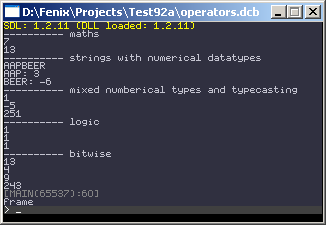From FenixWiki
[edit] List of Operators
[edit] General
| Operator | - Description
|
| Type | - Get the ProcessTypeID of a ProcessType or define a new datatype. See Type.
|
| . (period) | - Element access. <struct>.<element>. In case of a struct array, if no arrayelement is specified, it points to [0] (see example).
|
| Operator | - Description
|
| + | - Addition.
|
| - | - Deduction
|
| * | - Multiplication.
|
| / | - Division.
|
| Operator | - Description
|
| || | - OR. One or the other or both.
|
| && | - AND. Both.
|
| ^^ | - XOR. One or the other, but not both.
|
| ! | - NOT.
|
[edit] Bitwise
(Logical operation per bit.)
| Operator | - Description
|
| | | - BOR. One or the other or both.
|
| & | - BAND. Both.
|
| ^ | - BXOR. One or the other, but not both.
|
| ~ | - BNOT.
|
| << | - Bitshift left, causes bits to move left a certain number of positions.
|
| >> | - Bitshift left, causes bits to move right a certain number of positions.
|
[edit] Memory
| Operator | - Description
|
| & | - OFFSET. Get the memory address of a variable. See pointer.
|
| * | - POINTER. Get access to the variable a pointer is pointing to. See pointer.
|
[edit] Example
Type _point
int x;
int y;
End
Global
int int_1 = 1;
int int_3 = 3;
int int_4 = 4;
int someint = -5;
String somestring = "AAP";
String anotherstring = "BEER";
byte somebyte = 6;
signed byte sbyte = -2;
byte b_5 = 5;
byte b_12 = 12;
Struct Person[9]
string name;
int age;
End
_point myPoint;
End
Process Main()
Begin
say("---------- maths");
say(int_3 + int_4);
say(int_3 * int_4 + 1);
say("---------- strings with numerical datatypes");
say(somestring + anotherstring);
say(somestring + ": " + int_3);
say(anotherstring + ": " + int_3*sbyte);
say("---------- mixed numberical types and typecasting");
say(somebyte+someint);
say((signed byte)someint);
say((unsigned byte)someint);
say("---------- logic");
say(int_1&&int_4);
say(int_4==int_3+int_1);
say(!(somestring==anotherstring));
say("---------- bitwise");
say(b_5|b_12); // 00000101
// 00001100
// -------- |
// 00001101 = 13
say(b_5&b_12); // 00000101
// 00001100
// -------- &
// 00000100 = 4
say(b_5^b_12); // 00000101
// 00001100
// -------- ^
// 00001001 = 9
say(~b_12); // 00001100
// -------- ~
// 11110011 = 243
person.name = "Mies"; // these are the same
person[0].name = "Mies"; //
person[1].name = "Aap";
person[2].name = "Noot";
// ...etc...
person[9].name = "Last person"; // last array element
setXY(&myPoint);
Repeat
frame;
Until(key(_ESC))
End
Function int setXY(_point* p)
Begin
p.x = 3; // this is actually (*p).x = 3, but . can be used like this
p.y = 5; // this is actually (*p).y = 5, but . can be used like this
return 0;
End
Used in example: say(), key(), Global, Type, Struct, Array, Pointer, period
This will result in something like:

- operator results
|

